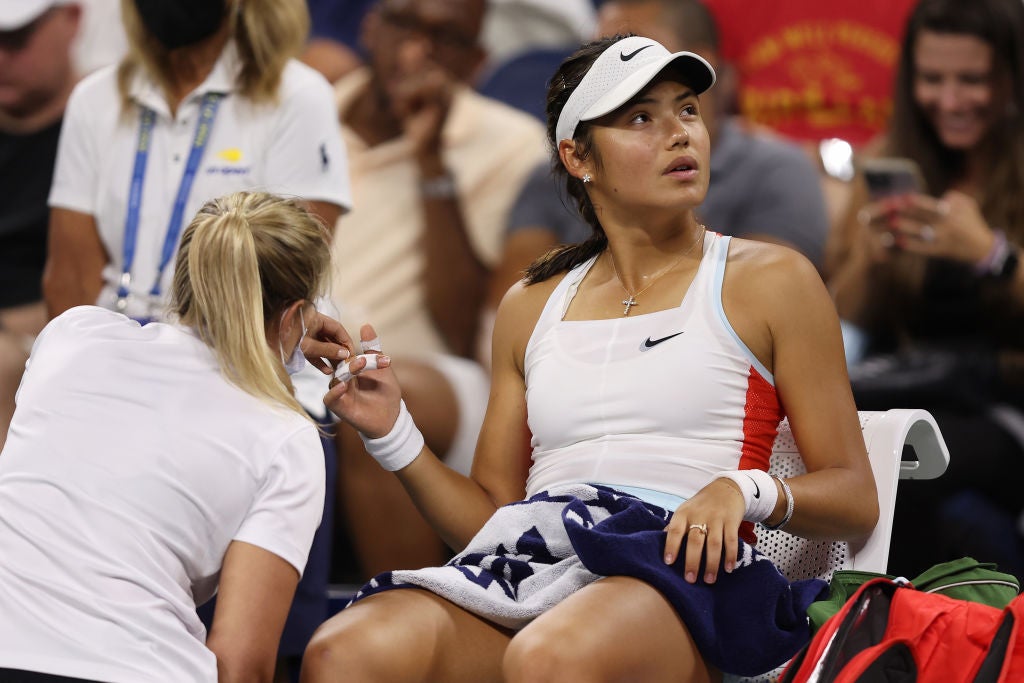
After a sudden, dizzying ascent, Emma Raducanu now faces a tougher, far longer climb. When discussing the fragility of success in sport, the former Arsenal manager Arsene Wenger once described confidence as going “up by the stairs and down by the lift”. In many ways, it is the reverse of Raducanu’s last 12 months, with her stunning victory in New York last September followed by a challenging debut year, culminating in her first-round defeat to Alize Cornet as she began her US Open defence.
It is true now, though, of what Raducanu approaches as she attempts to build herself back.
Like it was prior to arriving at Flushing Meadows, perspective is required when dealing with Raducanu’s exit. The 19-year-old’s straight-sets defeat to Cornet should not be treated with the same level of surprise that would normally accompany the defending champion losing in the opening round. Raducanu may have had a couple of encouraging results in Cincinnati in her lead-up to New York, but she has not carried the form and consistency of a player ranked 11th in the world into the US Open. In the experienced and wily Cornet, she was met with arguably the toughest draw you could realistically expect for a seeded player at a major.
And so it proved. Raducanu didn’t drop a single set in 10 wins at the tournament last year but on a sticky and breezy night in New York, Cornet was predictably awkward and embraced her role as underdog – just as she did when knocking Iga Swiatek out of Wimbledon. Raducanu was hampered by blisters, her head dropped at unforced errors and she was hesitant to attack a vulnerable serve, while Cornet offered far more variety of touch and composure at the net. From there, and as Cornet sealed a deserved 6-3 6-3 victory, Raducanu’s exit from the Louis Armstrong Stadium was swift.
Afterwards, she was down and despondent, her face hidden by a baseball cap when discussing a result that had been forewarned. Weeks earlier, ahead of the WTA tournament in Toronto, she had spoken of looking forward to a “clean slate” after the US Open. If there was a positive to be taken from the evening, Raducanu now has the fresh start she was looking for. “The target will be off my back,” she said.
The reality of that new beginning would be sobering if it had not been expected. With Raducanu now losing the 2,000 or so ranking points she gained by winning a grand slam last year, her position will fall approximately 70 places to around 80th in the world. Depending on how far Harriet Dart can go following her impressive opening victory over Daria Kasatkina, Raducanu may also lose her status as British No 1 by the end of the week. There is a risk of these blows coming across as harsh, humbling experiences if they had not been prepared for.

Her victory last September shifted expectations for a teenager with little experience of life on the professional tour. In the year since, she’s been unable to gather momentum, lacking the rhythm to get through to the latter stages of competitions or consistently win back-to-back matches. Raducanu has had rough draws since earning her elevated ranking, even with the occasional first-round bye. As she now looks to battle back, her chances of running into top 10 players and in-form opponents earlier in tournaments become far more likely, the task on paper becoming that bit harder.
A new position further down the rankings will be more reflective of her past 12 months, though, and could also help her to rediscover the bold, attacking play that defined her unexpected run at Flushing Meadows last year. Amid the pressure of being a reigning grand slam champion, Raducanu has only shown flashes of that form since – notably when she beat former world No 1s Serena Williams and Victoria Azarenka. If approached correctly, the challenge of clawing herself back could allow her to find freedom and belief in her game.
She may have to do so, initially, on the outer orbits of the WTA tour, scrapping for wins and ranking points in the year-long grind that can often feel removed from the glamour of the grand slams. To enjoy a tournament run again she most of all needs a settled team around her and time to build match fitness after disruption both on and on the court this season. Dmitry Tursunov was in her box at the US Open but there is uncertainty over whether they will continue working together, while the problems caused by blisters on her racket fingers refuse to go away.
There is less scrutiny away from the spotlight of the grand slams, which is where Raducanu will find herself in the next four months before the Australian Open. If the chapter of her career between US Open win and tournament defence is now over, the next could begin at tournaments in Tallinn and the Transylvania Open. If this is the road Raducanu faces now, her progress will be far more instructive than the previous climb.







